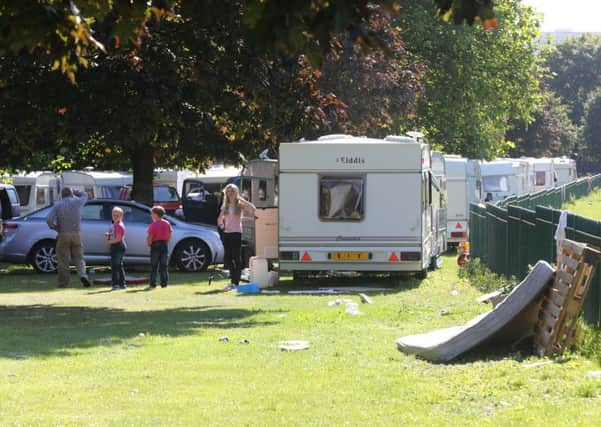28-day '˜amnesty' period for Leeds gypsy and traveller convoys as they are allowed onto vacant housing land


The pioneering scheme - thought to be the first of it kind in the country -will see nine temporary caravan sites created on a rolling basis on vacant pockets of land which are awaiting redevelopment.
Traveller families would be allowed to stay on the sites for up to 28 days with no fear of being evicted, but would have to sign a good behaviour contract with the council.
Advertisement
Hide AdAdvertisement
Hide AdThe so called “negotiated stopping sites” would be spread fairly across the city, it is claimed, and no one site would be used for the purpose more than once in any 12 month period.
Skips and portaloos would also be provided by the local authority, and no single site would accommodate more than nine caravans at a time.
The idea is part of Leeds’s wider strategy to provide traveller pitches as part of its Site Allocations Plan. The council has to provide 62 individual permanent pitches.
The YEP has previously reported that Leeds City Council spent £3m in a decade on clean-up and eviction costs. Updated figures reveal that between 2012 and 2017, the authority has spent £800,000 on the issue.
Advertisement
Hide AdAdvertisement
Hide AdHowever the introduction of a temporary site in Kidacre Street - and liaison with families through the Gypsy and Traveller Exchange (GATE) - has helped slash the overall bill to the taxpayer by 60 percent.
Councillor Peter Gruen, who sits on the Development Plans Panel, said the scheme - which awaits final approval from the council’s cabinet - was a “pioneering” and “flexible” way to deal with a long standing issue, which would also save on costs.
He said the council and traveller families would enter into a “toleration agreement”.
“Most families, we think, will only stay for a week or so, for events like weddings.
Advertisement
Hide AdAdvertisement
Hide Ad“In the past, if they left a mess, we never knew where they were.
“But with this, they will have to sign what is essentially a positive behaviour agreement.
“If they misbehave, hopefully we will get some recompense.”
Coun Gruen stressed that the sites to be used would not be “fixed sites”, and would be “flexible according to where there is a bit of land being redeveloped”.
HOW THE TRAVELLER/COUNCIL GOOD BEHAVIOUR CONTRACT WOULD WORK
Advertisement
Hide AdAdvertisement
Hide AdThe council will decide if a site where a traveller convoy has “pulled up” in Leeds is appropriate as a “negotiated stopping” site. This will depend on a range of factors around suitability, accessibility, landownership and risk.
If the site is not suitable, then the council will identify an alternative suitable site to which “G&T visitors” will be directed.
Negotiated stopping sites will be used for short periods of time only (i.e. less than 28 days) and will not be used again within a year. “This enables a spread of opportunities for temporary sites throughout Leeds rather than in specific wards or communities,” says the council.